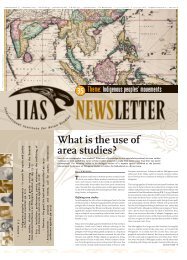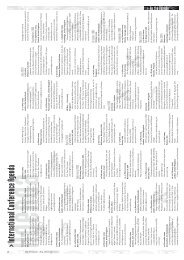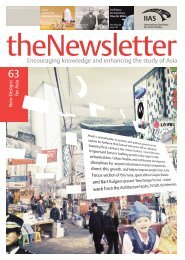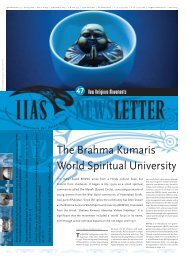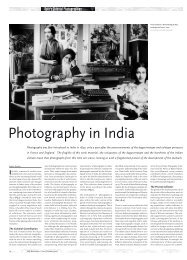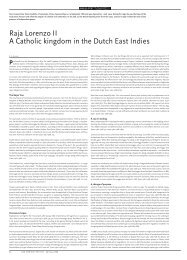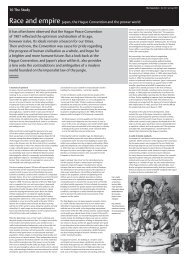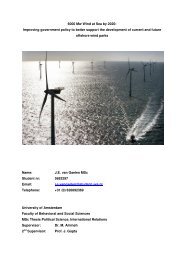The voice on the postcolonial stage - IIAS
The voice on the postcolonial stage - IIAS
The voice on the postcolonial stage - IIAS
You also want an ePaper? Increase the reach of your titles
YUMPU automatically turns print PDFs into web optimized ePapers that Google loves.
32 | <str<strong>on</strong>g>The</str<strong>on</strong>g> Focus<br />
<str<strong>on</strong>g>The</str<strong>on</strong>g> Newsletter | No.64 | Summer 2013<br />
<str<strong>on</strong>g>The</str<strong>on</strong>g> <str<strong>on</strong>g>voice</str<strong>on</strong>g> <strong>on</strong> <strong>the</strong> postcol<strong>on</strong>ial <strong>stage</strong><br />
Macanese or Macaense, regarded as <strong>the</strong> ‘sunset creole’ people of Macau, comprise a mere 5% of <strong>the</strong> ex-col<strong>on</strong>y’s<br />
populati<strong>on</strong>. This article offers insight into <strong>the</strong> cultural, political and structural changes, within <strong>the</strong> postcol<strong>on</strong>ial c<strong>on</strong>text,<br />
of Dóci Papiáçam di Macau – <strong>the</strong> sole <strong>the</strong>atre group performing in a ‘critically endangered’ creole language: Patuá.<br />
Maria Elisabela Larrea Y Eusébio<br />
In <strong>on</strong>e room, a middle-aged and well-dressed man murmurs<br />
his lines while animatedly waving his hands in <strong>the</strong> air. His<br />
serious expressi<strong>on</strong> portends <strong>the</strong> determinati<strong>on</strong> and importance<br />
he invests in his endeavor. In ano<strong>the</strong>r room, a mirror reflects<br />
a brush stroke <strong>on</strong> an actor’s face, who sits still in her chair<br />
while checking carefully that her makeup is applied perfectly.<br />
Laughter echoes al<strong>on</strong>g <strong>the</strong> hallway. One can always find a joke<br />
around <strong>the</strong> corner, or some<strong>on</strong>e gulping down a chilicote 1 while<br />
avoiding <strong>the</strong> crumbs that fall <strong>on</strong> his costume. <str<strong>on</strong>g>The</str<strong>on</strong>g> back<strong>stage</strong><br />
amplifier transmits an announcement by <strong>the</strong> director in<br />
Portuguese, Cant<strong>on</strong>ese, and English. Representing different<br />
generati<strong>on</strong>s and ethnicities, <strong>the</strong> actors and crew speak various<br />
languages yet achieve <strong>the</strong> rapport of an extended family.<br />
<str<strong>on</strong>g>The</str<strong>on</strong>g> Macanese, an epi<strong>the</strong>t for <strong>the</strong> mestizo individuals who<br />
resulted from intermarriage am<strong>on</strong>g <strong>the</strong> Portuguese col<strong>on</strong>izers<br />
and <strong>the</strong>ir ostensible Chinese subjects, are Macau’s indigenous<br />
Eurasian residents. However, not quite an ethnic group and<br />
not exactly a nati<strong>on</strong>ality, <strong>the</strong> actual definiti<strong>on</strong> of Macanese<br />
is notoriously ambiguous. Generally having an element of<br />
Portuguese heredity, <strong>the</strong>y are a bilingual (or even trilingual)<br />
cultural group, fluent mostly in Portuguese, Cant<strong>on</strong>ese<br />
and/or English. <str<strong>on</strong>g>The</str<strong>on</strong>g> Macanese traditi<strong>on</strong>ally distinguished<br />
<strong>the</strong>mselves from o<strong>the</strong>r ethnic communities through <strong>the</strong>ir<br />
specific combinati<strong>on</strong> of religious customs, gastr<strong>on</strong>omy and<br />
a Portuguese-based creole language, Patuá.<br />
This language of Macao was first borrowed from papiá<br />
cristang of Malacca and <strong>the</strong>n later influenced by Cant<strong>on</strong>ese,<br />
English and Spanish elements, and particularly by <strong>the</strong> Indian<br />
Canarim, a language of Goa. 2 Known also as língua nh<strong>on</strong>ha<br />
[women’s language] and papiâ Cristâm di Macau [Christian<br />
Language of Macau], 3 learning this language requires some<br />
level of group bel<strong>on</strong>gingness and knowledge passed down<br />
orally across generati<strong>on</strong>s. Today spoken fluently by <strong>on</strong>ly<br />
a handful of people, Patuá has been enlisted as a ‘critically<br />
endangered’ language by UNESCO.<br />
<str<strong>on</strong>g>The</str<strong>on</strong>g> Macanese in Macau<br />
Though <strong>the</strong> Macanese comprise <strong>on</strong>ly 5% of <strong>the</strong> local Macau<br />
populati<strong>on</strong>, <strong>the</strong> overwhelming majority of <strong>the</strong> Macanese<br />
populati<strong>on</strong> is actually outside of Macau and scattered around<br />
<strong>the</strong> world, in <strong>the</strong> United States, Australia, Canada, Portugal<br />
and Brazil. Two major Macanese diaspora events c<strong>on</strong>tributed<br />
to this dispersi<strong>on</strong>. <str<strong>on</strong>g>The</str<strong>on</strong>g> first was <strong>the</strong> 123 incident in Macau,<br />
a state turmoil in 1966 resulting from a deadly c<strong>on</strong>fr<strong>on</strong>tati<strong>on</strong><br />
between Portuguese authorities and Chinese locals that<br />
created political instability for <strong>the</strong> Macanese, and resulted<br />
in <strong>the</strong>ir emigrati<strong>on</strong>. <str<strong>on</strong>g>The</str<strong>on</strong>g> sec<strong>on</strong>d diaspora was prompted<br />
by <strong>the</strong> signing of <strong>the</strong> Sino-Luso Joint Declarati<strong>on</strong> in 1987,<br />
declaring that Macau’s days under Portuguese administrati<strong>on</strong><br />
were numbered. Preliminary statistics show that prior to <strong>the</strong><br />
handover of <strong>the</strong> territory, <strong>the</strong> number of Macanese in Macau<br />
topped over 11,000, whereas in 2001, <strong>the</strong> number of residents<br />
with Portuguese descent dropped to around 7,000. 4 <str<strong>on</strong>g>The</str<strong>on</strong>g>se<br />
two major phases of ethnic identity crisis gave rise to <strong>the</strong><br />
establishment of a number of Casas de Macau (i.e., Macanese<br />
associati<strong>on</strong>s) around <strong>the</strong> world. In 1993, <strong>the</strong> first Enc<strong>on</strong>tro<br />
Das Comunidades Macaenses with over 600 representatives<br />
of Macanese clubs and associati<strong>on</strong>s worldwide, ga<strong>the</strong>red in<br />
Macau with <strong>the</strong> aim of reinforcing <strong>the</strong> group’s cultural identity<br />
and preparing <strong>the</strong> Macanese community for <strong>the</strong> transformati<strong>on</strong><br />
of sovereignty. Since <strong>the</strong>n, <strong>the</strong> Enc<strong>on</strong>tro would be held<br />
every three years, where <strong>the</strong> Macanese community members<br />
indulge in Patuá plays, parties, and traditi<strong>on</strong>al cuisine.<br />
Macau, a small territory that initially held just 8 km 2 of landmass<br />
situated at <strong>the</strong> estuary of <strong>the</strong> Pearl River at Sou<strong>the</strong>rn China,<br />
has been a site of c<strong>on</strong>tact, communicati<strong>on</strong>, and c<strong>on</strong>troversy<br />
between <strong>the</strong> East and <strong>the</strong> West for over four centuries; in <strong>the</strong><br />
past two decades it has been transformed into an internati<strong>on</strong>al<br />
city of glamour and prosperity. With <strong>the</strong> establishment of <strong>the</strong><br />
Macau S.A.R. government in 1999, <strong>the</strong> preference for official<br />
languages and cultural manifestati<strong>on</strong>s shifted to that of <strong>the</strong><br />
new administrative powers. Once claimed to be <strong>the</strong> true ‘s<strong>on</strong>s<br />
of Macau’ who aimed to integrate <strong>the</strong>mselves culturally with<br />
<strong>the</strong> col<strong>on</strong>ial populati<strong>on</strong>, <strong>the</strong> Macanese are now facing cultural<br />
infusi<strong>on</strong> from <strong>the</strong> ex-col<strong>on</strong>ized. Pushed to <strong>the</strong> periphery of <strong>the</strong><br />
public sector and coveted government positi<strong>on</strong>s, <strong>the</strong> Macanese<br />
who <strong>on</strong>ce sought affiliati<strong>on</strong> with Portugal are now ir<strong>on</strong>ically<br />
being c<strong>on</strong>sidered for possible enlisting as <strong>the</strong> 57th officiallyrecognized<br />
ethnic group of Greater China. Although <strong>the</strong><br />
Macau S.A.R. government aims to promote Macau as a place<br />
of harm<strong>on</strong>y am<strong>on</strong>g diverse cultures, nati<strong>on</strong>al identificati<strong>on</strong><br />
and pedagogical strategies have subsequently shifted to more<br />
overt identificati<strong>on</strong> with People’s Republic of China. Meanwhile,<br />
<strong>the</strong> Macanese have proclaimed <strong>the</strong> importance of <strong>the</strong>ir<br />
existence by presenting <strong>the</strong>mselves as <strong>the</strong> ‘difference’ Macau<br />
possesses after <strong>the</strong> handover, compared to o<strong>the</strong>r Chinese cities,<br />
through <strong>the</strong> ic<strong>on</strong>ic creole image of <strong>the</strong>ir Eurasian culture.<br />
<str<strong>on</strong>g>The</str<strong>on</strong>g> revival of Patúa <strong>the</strong>atre<br />
Dóci Papiáçam di Macau, literally <strong>the</strong> Sweet Language of Macau,<br />
is a <strong>the</strong>atrical company largely composed of amateur <strong>the</strong>spians<br />
from <strong>the</strong> Macanese community. It is <strong>the</strong> sole <strong>the</strong>atre group<br />
using this endangered language in <strong>the</strong>atrical performances,<br />
or recitas, with <strong>the</strong>mes including social and political criticism,<br />
and gossip and folk-tales that circulate throughout <strong>the</strong> daily<br />
Above: <str<strong>on</strong>g>The</str<strong>on</strong>g>atrical<br />
piece Qui Pandalhada,<br />
performed by<br />
various generati<strong>on</strong>s<br />
of Macanese actors,<br />
2011. (Photo courtesy<br />
of Le<strong>on</strong>or Rosário)<br />
discourse of <strong>the</strong> Macanese community. In 2012, <strong>the</strong> Patuá<br />
<strong>the</strong>atre was included in <strong>the</strong> Intangible Cultural Heritage<br />
of Macau, marking its importance <strong>on</strong> <strong>the</strong> global platform.<br />
Having been in <strong>the</strong> audience of this annual performance<br />
since 2001, and a member of <strong>the</strong> back<strong>stage</strong> crew of<br />
Dóci Papiáçam di Macau since 2007, I have been an active<br />
participant-observer in <strong>the</strong> group. My own cultural identity<br />
as a Macanese with Chinese, Portuguese, and Basque heritage<br />
has facilitated my interest and involvement. <str<strong>on</strong>g>The</str<strong>on</strong>g> core<br />
membership of <strong>the</strong> group remains restricted to Macanese,<br />
yet in recent years, <strong>the</strong> company has fur<strong>the</strong>r incorporated<br />
<strong>the</strong> use of Chinese and Portuguese language in <strong>the</strong>ir<br />
performances, extending <strong>the</strong>ir collaborati<strong>on</strong> with local<br />
<strong>the</strong>atrical groups, and performing not <strong>on</strong>ly with Macanese<br />
amateurs, but also Chinese and Portuguese individuals.<br />
I first watched Dóci’s performances at <strong>the</strong> Cultural Centre<br />
of Macau in 2001 when my parents brought me al<strong>on</strong>g to <strong>the</strong><br />
show. My mo<strong>the</strong>r, a fourth-generati<strong>on</strong> Macanese, wanted<br />
to savor her childhood memories that <strong>the</strong>se performances<br />
evoked – a reminder of her grandmo<strong>the</strong>r’s language as<br />
well as <strong>the</strong> col<strong>on</strong>ial era that was filled with Macanese and<br />
Portuguese t<strong>on</strong>es. Only at that moment did I realize that<br />
I actually understood <strong>the</strong> language, without having heard<br />
it spoken explicitly before. It was <strong>the</strong>n that I came to know<br />
certain phrases or words that my Macanese relatives spoke<br />
were actually Patuá and not formal Portuguese.<br />
I first approached <strong>the</strong> group as a documentary filmmaker. 5<br />
Though I was greeted with friendly smiles, I knew I was being<br />
observed. Finally, <strong>the</strong> questi<strong>on</strong> came up in Patuá, “Vôs sâm fila<br />
di quem?” (Who are you <strong>the</strong> daughter of?). This was <strong>the</strong> open<br />
door allowing me into <strong>the</strong> group. <str<strong>on</strong>g>The</str<strong>on</strong>g> ambiguous boundaries<br />
that delineate Macanese identity are often formed by tracing<br />
<strong>the</strong> family histories of its members. I immediately identified<br />
myself and <strong>the</strong>y were able to c<strong>on</strong>nect <strong>the</strong>ir family ties to mine.<br />
However, it was not until <strong>the</strong> following year when I became<br />
a member of <strong>the</strong> back<strong>stage</strong> crew did I receive <strong>the</strong> ‘family-like’<br />
treatment. Once I joined <strong>the</strong> group sarcastic comments<br />
became more pr<strong>on</strong>ounced, since to be <strong>on</strong>e of us, <strong>on</strong>e needs<br />
to know how to joke around and not take it pers<strong>on</strong>ally, i.e.,<br />
like many families do. Alfredo Ritchie, an actor in <strong>the</strong> <strong>the</strong>atre<br />
group since 2001, recalls his first encounter of Patuá at <strong>the</strong><br />
age of six, characterizing it as “a means of communicati<strong>on</strong><br />
between amigas [female friends] and it is always about jokes,<br />
in a jolly atmosphere and manner, between people that were<br />
closely acquainted. But despite that, in those times, Patuá<br />
was not outspoken.” 6
<str<strong>on</strong>g>The</str<strong>on</strong>g> Newsletter | No.64 | Summer 2013<br />
<str<strong>on</strong>g>The</str<strong>on</strong>g> Focus | 33<br />
Cultural c<strong>on</strong>texts and functi<strong>on</strong>s of <strong>the</strong> creole <strong>the</strong>atre<br />
Over <strong>the</strong> next few years, I realized <strong>the</strong> importance <strong>the</strong>se<br />
performances had <strong>on</strong> <strong>the</strong> Macanese community, especially<br />
at <strong>the</strong> time of <strong>the</strong> transiti<strong>on</strong> of sovereignty. Language is a<br />
crucial comp<strong>on</strong>ent of identity c<strong>on</strong>structi<strong>on</strong>. During <strong>the</strong> col<strong>on</strong>ial<br />
era, many Macanese discarded <strong>the</strong>ir creole accents in hopes<br />
of aligning <strong>the</strong>mselves with <strong>the</strong> col<strong>on</strong>ial power. <str<strong>on</strong>g>The</str<strong>on</strong>g>y imagined<br />
that speaking pure Portuguese would provide access to<br />
a higher social rank and positi<strong>on</strong>s of power.<br />
Maria, a fourth-generati<strong>on</strong> descendent of a local-born<br />
Macanese, <strong>on</strong>ly heard Patuá from her grandmo<strong>the</strong>r, who<br />
passed away when she was 10 years old. She expressed that<br />
in her parents’ era, i.e., <strong>the</strong> 1950s, Macanese men needed to<br />
serve in <strong>the</strong> military for two years. <str<strong>on</strong>g>The</str<strong>on</strong>g> leading military ranks<br />
bel<strong>on</strong>ged to Portuguese of little educati<strong>on</strong> but much influence;<br />
thus <strong>the</strong> Macanese, comparatively ‘smarter’ as Maria puts it,<br />
would be abused and deliberately sneered at if <strong>the</strong>y did not<br />
speak perfect Portuguese. “I believe <strong>the</strong>y suffered a lot in that<br />
era, thus our generati<strong>on</strong> were forced to aband<strong>on</strong> Patuá and acquire<br />
pure Portuguese, to get rid of <strong>the</strong> creole sutaque [accent].<br />
However, now we are desperate, we want to grab back our own<br />
creole language. We are no l<strong>on</strong>ger under <strong>the</strong> Portuguese administrati<strong>on</strong>,<br />
so no <strong>on</strong>e is here to criticize our accents. Although<br />
we are now a Chinese special administrative regi<strong>on</strong>, we are<br />
not Chinese, we are Macanese. And Patuá is ours; it bel<strong>on</strong>gs<br />
to us, Macanese. So we are now joining toge<strong>the</strong>r, taking every<br />
opportunity to learn from each o<strong>the</strong>r <strong>the</strong> little Patuá that we<br />
recall. We are like kids now, learning a language, our language,<br />
<strong>the</strong> language that bel<strong>on</strong>gs to <strong>the</strong> Macanese, Patuá.<br />
<str<strong>on</strong>g>The</str<strong>on</strong>g> Patua thus served as a vital source of identity and community.<br />
Miguel de Senna Fernandes, director of <strong>the</strong> Dóci Papiáçam<br />
di Macau, who co-authored with Alan Baxter <strong>the</strong> first book that<br />
documented <strong>the</strong> vocabulary and expressi<strong>on</strong>s of Patuá, said that<br />
<strong>the</strong> creole <strong>the</strong>atre was originally part of <strong>the</strong> carnival manifestati<strong>on</strong>s,<br />
where <strong>the</strong> hierarchically subordinated language allowed<br />
Macanese to entertain and express <strong>the</strong>ir dissatisfacti<strong>on</strong> with<br />
social issues. “If people wanted to critique <strong>the</strong> government or<br />
sarcastically comment <strong>on</strong> some<strong>on</strong>e, <strong>the</strong>y would use Patuá to<br />
do so. <str<strong>on</strong>g>The</str<strong>on</strong>g> reas<strong>on</strong> is that Patuá was spoken by <strong>the</strong> lower class<br />
people, and thus, <strong>the</strong> criticisms and <strong>the</strong> c<strong>on</strong>tents are from <strong>the</strong>ir<br />
perspective. [… ]This is actually people’s <str<strong>on</strong>g>voice</str<strong>on</strong>g>, to raise <strong>the</strong><br />
awareness of various social issues.” 7<br />
In my doctoral <strong>the</strong>sis project, I am interested in <strong>the</strong> ways<br />
<strong>the</strong> Macanese utilize <strong>the</strong> <strong>the</strong>atrical <strong>stage</strong> as a ‘third space’<br />
to mediate collective historical memories. <str<strong>on</strong>g>The</str<strong>on</strong>g> performances<br />
of Dóci Papiaçám di Macau are now incorporated as part of<br />
<strong>the</strong> government-administrated Macau Arts Festival. To present<br />
Macau as <strong>the</strong> ‘world of difference’, <strong>the</strong> distinct Macanese<br />
culture has been commodified to enhance <strong>the</strong> city’s<br />
internati<strong>on</strong>al tourism image. At <strong>the</strong> same time, <strong>the</strong> <strong>stage</strong> still<br />
allows <strong>the</strong> Macanese to express <strong>the</strong>ir views about <strong>the</strong> changes<br />
<strong>the</strong>y have c<strong>on</strong>fr<strong>on</strong>ted after <strong>the</strong> shift of Macau’s sovereignty<br />
from Portugal to China. Through <strong>the</strong> display of <strong>the</strong>ir ethnic<br />
identity, <strong>the</strong>y redefine <strong>the</strong>mselves, both culturally and socially.<br />
<str<strong>on</strong>g>The</str<strong>on</strong>g>atrical <strong>the</strong>mes<br />
I have transcribed video recordings of some Patuá<br />
performances: <strong>on</strong>e performance in 1993, prior to <strong>the</strong><br />
handover, Olâ Pisidénte [See <strong>the</strong> President] and ano<strong>the</strong>r in 2011,<br />
after <strong>the</strong> handover, Qui Pandalhada [What Pandam<strong>on</strong>ium].<br />
<str<strong>on</strong>g>The</str<strong>on</strong>g>se performances offer various insights in <strong>the</strong> presentati<strong>on</strong>al<br />
structures, <strong>the</strong> choice of language used by <strong>the</strong> master of<br />
cerem<strong>on</strong>y, <strong>the</strong> ratio of creole language to o<strong>the</strong>r languages<br />
within <strong>the</strong> performance, <strong>the</strong> body languages, and in particular,<br />
<strong>the</strong> topics and <strong>the</strong>mes included in <strong>the</strong> performances.<br />
Although <strong>the</strong>se two performances were highlighted for<br />
in-depth analysis, I have also analyzed <strong>the</strong> emergent <strong>the</strong>mes<br />
of all of <strong>the</strong> performances between 1993 and 2011. In <strong>the</strong><br />
years prior to <strong>the</strong> handover, cultural attributes and <strong>the</strong>mes<br />
relating to <strong>the</strong> nati<strong>on</strong> of Portugal are most obvious; for<br />
instance Olâ Pisidénte (1993) commented <strong>on</strong> <strong>the</strong> Portuguese<br />
president, Portuguese c<strong>on</strong>sulate and Governor of Macau;<br />
Mano Beto Vai Sai<strong>on</strong>g [Big bro<strong>the</strong>r go to Portugal] (1994) dealt<br />
with issues of Macanese immigrating to Portugal; and Sai<strong>on</strong>g<br />
Téra Galante [Portugal, <strong>the</strong> great land] (1996), is a story set<br />
in Portugal that featured Macanese immigrants who, despite<br />
<strong>the</strong>ir loyalty and l<strong>on</strong>ging to <strong>the</strong> mo<strong>the</strong>rland, would find<br />
<strong>the</strong>mselves estranged by <strong>the</strong> locals and thus realize that<br />
<strong>the</strong>ir roots were in Macau. Yet, after <strong>the</strong> handover, issues<br />
c<strong>on</strong>cerning <strong>the</strong> nati<strong>on</strong> of Portugal are absent and stories have<br />
been comparatively more localized. Family encounters such<br />
as Pápi tá ferado [Fa<strong>the</strong>r is screwed] (2000) and Mama-sogra<br />
Jâ Chega [Mo<strong>the</strong>r-in-law is arriving] (2003) were prevalent,<br />
as well as stories dealing with local social issues including<br />
health care, discussed in Cuza Dotôr [What’s up Doc] (2007);<br />
<strong>the</strong> gambling industry in Sorti Dóci [Sweet Luck] (2008);<br />
legal and political issues portrayed in Letrado Chapado<br />
[Right, Mr. Counselor] (2009); and finally <strong>the</strong> administrative,<br />
political and social issues discussed in Qui Pandalhada<br />
[What Pandam<strong>on</strong>ium] (2011).<br />
In <strong>the</strong> col<strong>on</strong>ial era, <strong>the</strong> Macanese were hierarchically<br />
subordinate to <strong>the</strong> Portuguese but enjoyed superior social<br />
status when compared with <strong>the</strong> Chinese. Yet, in <strong>the</strong> plays of<br />
<strong>the</strong> postcol<strong>on</strong>ial era, <strong>the</strong> Macanese are portrayed as clearly<br />
subordinate to <strong>the</strong> Chinese. One example would be in Cuza<br />
Dotôr (2007), set at a ficti<strong>on</strong>al hospital in Macau, with Macanese<br />
characters who must answer to Chinese authorities who are<br />
portrayed in distinct outfits and pr<strong>on</strong>ounced accents. Ano<strong>the</strong>r<br />
example would be that of Qui Pandalhada (2011), which was set<br />
in a ficti<strong>on</strong>al casino that uses China’s nati<strong>on</strong>al emblem – <strong>the</strong><br />
Panda – as <strong>the</strong>ir mascot. In <strong>on</strong>e scene, <strong>the</strong> main characters<br />
Duarte, Martinho and Calito were to serve <strong>the</strong> American CEO<br />
of <strong>the</strong> casino and a Chinese government official, submissively<br />
suffering <strong>the</strong>ir excessive and abusive demands.<br />
When I analyzed <strong>the</strong> two respective performances, Olâ<br />
Pisidénte (1993) and Qui Pandalhada (2011), I noticed various<br />
shifts of performance patterns. First, <strong>the</strong>re was a change<br />
in language patterns. In Olâ Pisidénte (1993), 99% of <strong>the</strong> lines<br />
were delivered in Patuá whereas <strong>on</strong>ly 1% included Cant<strong>on</strong>ese<br />
and Portuguese. <str<strong>on</strong>g>The</str<strong>on</strong>g> difference in <strong>the</strong> 2011 performance,<br />
was pr<strong>on</strong>ounced, with 61% of <strong>the</strong> dialogue in Patuá, and<br />
<strong>the</strong> rest in English (26%), Portuguese (2%), Chinese (10%)<br />
and o<strong>the</strong>rs (1%).<br />
Sec<strong>on</strong>d, <strong>the</strong> <strong>the</strong>mes or subjects of <strong>the</strong> plays have also shifted<br />
from <strong>the</strong> inclusi<strong>on</strong> of Portugal to specifically local matters.<br />
<str<strong>on</strong>g>The</str<strong>on</strong>g> fact of decreased positi<strong>on</strong>al powers is fundamental to <strong>the</strong><br />
status quo of <strong>the</strong> minority in <strong>the</strong> transiti<strong>on</strong>al period, thus in <strong>the</strong><br />
last years of <strong>the</strong> col<strong>on</strong>ial era, <strong>the</strong>re were fears of loss of identity<br />
and social status. After <strong>the</strong> Sino-Portuguese Joint Declarati<strong>on</strong><br />
was signed, many Macanese realized that <strong>the</strong>y ‘could claim<br />
no collective existence in <strong>the</strong> law’. 8 <str<strong>on</strong>g>The</str<strong>on</strong>g> questi<strong>on</strong> of nati<strong>on</strong>al<br />
bel<strong>on</strong>gingness raised much anxiety and fear. <str<strong>on</strong>g>The</str<strong>on</strong>g> Macanese<br />
sang <strong>the</strong> Portuguese an<strong>the</strong>m as <strong>the</strong>ir an<strong>the</strong>m, raised <strong>the</strong><br />
Portuguese flag as <strong>the</strong>ir flag, yet <strong>the</strong>y identified Macau as <strong>the</strong>ir<br />
land. Though <strong>the</strong>y were entitled to Portuguese nati<strong>on</strong>ality<br />
and a Portuguese passport, when <strong>the</strong> time came, as <strong>the</strong>ir<br />
land no l<strong>on</strong>ger flew <strong>the</strong>ir flag, fears of <strong>the</strong>ir future increased.<br />
In Olâ Pisidénte (1993), <strong>the</strong> existential problematic of Macanese<br />
subjectivity in relati<strong>on</strong> to Portugal was broached:<br />
Below: Two young<br />
Macanese getting<br />
ready for <strong>the</strong>ir<br />
performance of<br />
Sorti Doci, 2007.<br />
(Photo courtesy of<br />
Elisabela Larrea)<br />
Actor: “I have a relative who lived in America for 20 years.<br />
That day, he went to <strong>the</strong> Portuguese c<strong>on</strong>sulate to renew his<br />
passport. That stupid guy from <strong>the</strong> c<strong>on</strong>sulate said to him<br />
that he couldn’t get it. […]He told him he’s Macau Filo [s<strong>on</strong> of<br />
Macau], he said can’t. He told him his fa<strong>the</strong>r and mo<strong>the</strong>r had<br />
Portuguese names, he said can’t. […] He told him he went to<br />
<strong>the</strong> military to serve Portuguese, he said can’t. […] I really d<strong>on</strong>’t<br />
understand, for our whole lives, we learnt to admire <strong>the</strong> red<br />
and green flag (Portuguese flag). Sing <strong>the</strong> nati<strong>on</strong>al an<strong>the</strong>m,<br />
if we are not Portuguese, not Chinese, <strong>the</strong>n who are we?” 9<br />
In <strong>the</strong> postcol<strong>on</strong>ial era, plays c<strong>on</strong>centrated <strong>on</strong> current local<br />
social issues. In Qui Pandalhada (2011), <strong>the</strong>mes included civil<br />
workers’ attitudes, importati<strong>on</strong> of foreign labor by casinos<br />
as well as <strong>the</strong> effects of a new cultural imperialism in Macau.<br />
<str<strong>on</strong>g>The</str<strong>on</strong>g>re were also comments about how life for <strong>the</strong> Macanese<br />
was harder today but at <strong>the</strong> same time, stressing that <strong>the</strong><br />
Macanese are vital for <strong>the</strong> c<strong>on</strong>tinuity of Macau’s prosperity<br />
as <strong>the</strong>y still serve <strong>the</strong>ir traditi<strong>on</strong>al role as <strong>the</strong> ‘middleman’<br />
or bridge between <strong>the</strong> East and <strong>the</strong> West. Negative influences<br />
resulting from <strong>the</strong> drastic increase of numbers of mainland<br />
Chinese in Macau were included in <strong>the</strong> plays as well. One<br />
example was <strong>the</strong> milk powder scandal, when Chinese flocked<br />
to Macau in <strong>the</strong> wake of a c<strong>on</strong>taminated baby formula scandal<br />
<strong>on</strong> <strong>the</strong> mainland to buy imported milk powder in <strong>the</strong> city,<br />
creating a scarce supply for local c<strong>on</strong>sumpti<strong>on</strong>.<br />
Patúa in <strong>the</strong> new millennium<br />
As a creole language, Patuá, had various functi<strong>on</strong>s in <strong>the</strong><br />
col<strong>on</strong>ial era. It served as a key to class distincti<strong>on</strong>s, where<br />
people who spoke <strong>the</strong> creole or ‘broken Portuguese’, were<br />
regarded as less educated and lower class. <str<strong>on</strong>g>The</str<strong>on</strong>g> recitas, prior<br />
to <strong>the</strong> establishment of <strong>the</strong> <strong>the</strong>atre groups, functi<strong>on</strong>ed as<br />
a means of expressing disc<strong>on</strong>tent and sarcasm that were<br />
restricted by social c<strong>on</strong>venti<strong>on</strong>s. With <strong>the</strong> change in Macau’s<br />
sovereignty, <strong>the</strong> functi<strong>on</strong>s of Patuá plays have been diversified<br />
and streng<strong>the</strong>ned. <str<strong>on</strong>g>The</str<strong>on</strong>g>y possess historical value and allow<br />
<strong>the</strong> creoles to trace <strong>the</strong>ir origins and reinforce <strong>the</strong>ir cultural<br />
roots. Patuá plays also functi<strong>on</strong> as an annual reuni<strong>on</strong> site for<br />
<strong>the</strong> community to ga<strong>the</strong>r, reinforcing <strong>the</strong> existence of <strong>the</strong>ir<br />
creole identity. <str<strong>on</strong>g>The</str<strong>on</strong>g> <strong>the</strong>atrical performances also serve as a<br />
means of cultural identificati<strong>on</strong> for <strong>the</strong> Macanese community<br />
in <strong>the</strong> new administrative envir<strong>on</strong>ment, allowing <strong>the</strong>m to<br />
present <strong>the</strong>ir identity to <strong>the</strong> o<strong>the</strong>r.<br />
Patuá and <strong>the</strong> c<strong>on</strong>tents of recitas were built up<strong>on</strong> folktales<br />
and daily lives of <strong>the</strong> Macanese community in <strong>the</strong> col<strong>on</strong>ial<br />
era; however, as globalizati<strong>on</strong> leads to diluti<strong>on</strong> of traditi<strong>on</strong>al<br />
practices, as well as an identity crisis that followed <strong>the</strong><br />
terminati<strong>on</strong> of Portuguese administrati<strong>on</strong>, <strong>the</strong> meanings of<br />
recitas have evolved to experience, where <strong>the</strong> importance<br />
of <strong>the</strong> c<strong>on</strong>tents are taken over by sentiments and identity<br />
reinforcements. But <strong>the</strong> symbolic value of Patua for <strong>the</strong><br />
Macanese community persists. As Miguel de Senna Fernandes<br />
suggests, “<str<strong>on</strong>g>The</str<strong>on</strong>g> significance of Patuá drama is to express<br />
Macanese state of mind. For instance, in what language do<br />
we think? This is significant to our cultural identity, what<br />
we think or speak. If we have to use a language to represent<br />
ourselves, it will definitely be Patuá, our Creole language”. 10<br />
Maria Elisabela Larrea Y Eusébio is producti<strong>on</strong> director<br />
and anchor of a televisi<strong>on</strong> program produced by <strong>the</strong> Macau<br />
Educati<strong>on</strong> and Youth Affairs Bureau. She is currently working<br />
<strong>on</strong> a PhD degree in <strong>the</strong> Department of Communicati<strong>on</strong>,<br />
University of Macau. (elisabelalarrea@gmail.com)<br />
Notes<br />
1 Chilicote is a Macanese snack made of minced pork and<br />
enclosed with flour wrappers in a half mo<strong>on</strong> shape.<br />
2 Amaro, A. 1994. ‘S<strong>on</strong>s and Daughters of <strong>the</strong> Soil: <strong>the</strong> first<br />
decade of Luso Chinese Diplomacy’, Review of Culture 20<br />
(2nd series English Editi<strong>on</strong>). Instituto Cultural of Macau.<br />
3 Senna Fernandes, M. and Baxter, A. 2004. Maquista Chapado:<br />
vocabulary and expressi<strong>on</strong>s in Macao’s Portuguese Creole.<br />
Macau: Cultural Instituti<strong>on</strong> of Macau.<br />
4 Larrea, E. 2008. Macanese in <strong>the</strong> global network:<br />
a study of post-col<strong>on</strong>ial Macanese cultural identity performance.<br />
Master <strong>the</strong>sis, Department of Communicati<strong>on</strong>. University<br />
of Macau.<br />
5 Between <strong>the</strong> years 2007-2008, I produced a documentary<br />
film illustrating some of <strong>the</strong> social practices by <strong>the</strong> Macanese,<br />
Filhos da Terra (S<strong>on</strong>s of <strong>the</strong> Land). This documentary is an<br />
attempt to capture festive moments and emoti<strong>on</strong>al sentiments<br />
of <strong>the</strong> Macanese in <strong>the</strong> new millennium.<br />
6 Translated by researcher, interview with Alfredo Ritchie,<br />
12-04-2011<br />
7 Translated by researcher, interview with Miguel de Senna<br />
Fernandes, 15-03-2011<br />
8 Clayt<strong>on</strong>, C. 2010. Sovereignty at <strong>the</strong> Edge: Macau and <strong>the</strong><br />
Questi<strong>on</strong> of Chineseness. Harvard University Asia Centre.<br />
9 Translated by researcher from transcript of Olâ Pisidénte (1993).<br />
10 Larrea, 2008.



